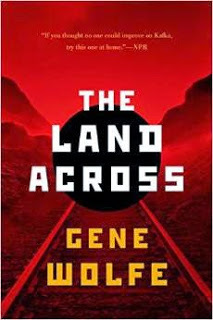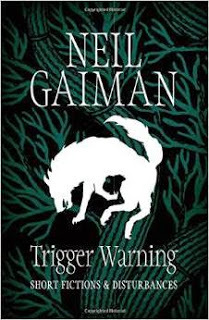Brian Clegg's Blog, page 71
June 3, 2015
Why I don't use OpenOffice
 What?Broadly speaking, most professional writers either use Word or a specialist program like the much-praised Scrivener, which is apparently excellent for fiction work. However, every now and then, someone asks me 'Why do you spend all that money on Office, when you can get OpenOffice for free - and you can just export a Word file when you need it?'
What?Broadly speaking, most professional writers either use Word or a specialist program like the much-praised Scrivener, which is apparently excellent for fiction work. However, every now and then, someone asks me 'Why do you spend all that money on Office, when you can get OpenOffice for free - and you can just export a Word file when you need it?'People have been saying this kind of thing to me ever since I ran the PC department at British Airways, and my answer has always been the same. If all you are doing is handling lightly formatted text, cheap and cheerful is fine, but as soon as you use the more sophisticated aspects of a word processing program, this kind of transfer becomes risky, and simply isn't worth it.
I've just had a good example of how things can go wrong using OpenOffice. I was sent a document to check as an ODT file - the file format from OpenOffice. It had a series of appended comments. The file doesn't open in Word or Pages, but I tried it in both Google Documents and Textedit and neither showed the comments. No problem - the person who produced it exported a Word document from OpenOffice for me. And, yes, it did have comments - but they had been bizarrely scrambled. The image above are some of the actual comments, rendered utterly unreadable - and none of them pointed to the right bit of body text. It was garbage, pure and simple.
In the end, I had to download a copy of OpenOffice and work on the original with that. As it happens this was fine, because it was this way round - OpenOffice happened to be the standard used by the company I was doing some work for. But almost all publishers, magazines etc. expect material in Word format. And if you are working in OpenOffice, you will have to export your document to Word. Potentially with the kind of result I just experienced.
By all means use OpenOffice for printed documents, or those for internal use. But if you intend to share anything more sophisticated that straightforward text with a publisher, say, in a professional capacity, then think twice about turning up your nose at Word.
Published on June 03, 2015 01:05
June 2, 2015
The dark side of Footlights
 We're used to the Cambridge dramatic society Footlights being a breeding ground for media humorists - the source of many of the UK's comedy greats over the years from Monty Python and the Goodies to the likes of David Mitchell and Richard Ayoade. But what's not quite so well known is the distinct lack of humour exhibited by some of its members back in the heady 1970s.
We're used to the Cambridge dramatic society Footlights being a breeding ground for media humorists - the source of many of the UK's comedy greats over the years from Monty Python and the Goodies to the likes of David Mitchell and Richard Ayoade. But what's not quite so well known is the distinct lack of humour exhibited by some of its members back in the heady 1970s.When I was at Cambridge, probably the most feted Footlights show was a frothy little number called Chox from 1974. The cast featured Clive Anderson (at the same college as me, though I don't think we ever spoke), Geoffrey McGivern, who played Ford Prefect in the radio version of Hitchhiker's Guide to the Galaxy, and Griff Rhys Jones. And amongst the writers was Douglas Adams himself.
Now I confess that I never saw Chox - to be honest, to most of us, the Footlights crew were considered a bit up themselves, though clearly some of them turned out okay. In fact it was much more trendy to go the Medical Society review, which was widely thought to be more edgy and genuinely funny. And this was never more so than it was that year. Because, in a stroke of genius, the Med Soc gang used a very similar poster to Footlights, but added a load of red spots, and named the show Pox.
Brilliant humour, yes? Only the funny guys at Footlights didn't see it that way and either sued, or at the very least threatened to sue. (It's a long time ago - details on that are a bit fuzzy.) Either way, it was hardly the right way to respond to an affectionate spot of snook cocking. The Med Soc show itself was mixed, but certainly had some decidedly funny bits. I've no idea if it produced any famous funny people - a lot do start off as medics - but I just think it's useful to put the glamorous associations of Footlights into context.
Published on June 02, 2015 00:58
June 1, 2015
TANSTAAFL
 The other day I got a piece of junk mail that made a bit of a change from the dubious deals and diet supplements: 'THE FIRST FREE ENERGY GENERATOR' it proclaimed, and just to rub it in, 'Humiliates top scientists.'
The other day I got a piece of junk mail that made a bit of a change from the dubious deals and diet supplements: 'THE FIRST FREE ENERGY GENERATOR' it proclaimed, and just to rub it in, 'Humiliates top scientists.'Well, there's nothing I like better than humiliating top scientists* and what's more, apparently this energy generator 'violates all the laws of physics', which is even more fun. So what would this involve? If you look up 'free energy generator' on Google you'll find lots of examples claiming to be just this - but overall it is a worrying concept.
The obvious problem is conservation of energy, one of the most fundamental aspects of physics. You have to be a little careful with conservation of energy - it does require a closed system, and we patently don't live in a closed system, so it's easy enough to get 'free' energy in the sense that the Sun is pumping vast quantities of it in our direction and doesn't expect to be paid for it. Similarly, a 'free energy generator' could just be a way to steal energy from someone else. It's perfectly possible to light a fluorescent strip light by earthing it near a high voltage power cable - but you aren't producing energy from nowhere, you are just acquiring (to put it euphemistically) a small amount from the power company. Which they probably aren't too enthusiastic about.
However, this kind of 'free energy' device is usually supposed to get energy from nowhere, so we are indeed talking breaking conservation of energy - and you might as well throw in perpetual motion, because the one implies the other. And that's a bit worrying because things have to come from somewhere... so where is the energy coming from? (You could also get a bit excited about the great German mathematician Emmy Noether's proof that conservation of energy was equivalent to symmetry in time, but that's probably too subtle to be useful here.) Energy conservation isn't always obvious, because energy can change forms and so become apparent where it wasn't obvious before - but in the end, this has to be one of the best established and easiest to support natural laws.
More dramatic still is the claim that this device violates ALL the laws of physics. I can't even begin to imagine what something that did that would be like. Of course, the concept of 'physical laws' is a little fuzzy. It really dates back to a time when it was assumed that God was in charge and these were the laws he laid down. A law requires the same thing to always happen in the same circumstances - in practice this can never be proven, but is a good assumption. However if all physical laws are broken, it would seem likely that the universe as we know it would fall apart, which doesn't sound too healthy. I'm not sure free energy is worth that consequence.
In the end, I refer the con men to that classic science fiction writer, Robert Heinlein who regularly pointed out TANSTAAFL. Not a shouty Scandinavian delicacy but: 'There ain't no such thing as a free lunch'.
* Actually there are plenty of things I like better than humiliating top scientists, this was just rhetoric.
Published on June 01, 2015 01:53
May 29, 2015
Don't diss the boasting shelf
 Pretty well all authors have a boasting shelf (though, of course, we don't call it that) - the shelf at home with a copy of our book(s) on. Preferably on display to the world.
Pretty well all authors have a boasting shelf (though, of course, we don't call it that) - the shelf at home with a copy of our book(s) on. Preferably on display to the world.I'm rather chuffed as mine has just filled shelf four.
Of course the purist might moan that surely lots of these are the same book. But I think it's legitimate to include translations, different formats (e.g. hardback and paperback), new editions with totally different covers and ARCs.
It might seem like self-indulgence, and it probably is. But I think it's something more, which is why I'm respectfully asking you not to disrespect it.
Often, writing a book is a bit of a damp squib of an experience. A new author might think that once the book is published they will see it in all the bookshops, and reviewed in all the important newspapers and such, while in reality it's pretty common that a book comes out and... nothing much happens.
So the physical reality of the boasting shelf, the ability to look occasionally and think 'I did that' to yourself - whether it's one book or groaning shelves - is something of a compensation for not being the next J. K. Rowling or Bill Bryson. And that can't be too bad.
Published on May 29, 2015 04:25
May 28, 2015
Yes, but what IS light?
 Thanks to Sabine Hossenfelder for drawing to my attention the little video below, asking people (in Germany) what light is. As a physicist, she was disappointed that most people don't realise that their idea of light was wrong. But as a science communicator, I find it neither disappointing nor surprising. Let's unpick that.
Thanks to Sabine Hossenfelder for drawing to my attention the little video below, asking people (in Germany) what light is. As a physicist, she was disappointed that most people don't realise that their idea of light was wrong. But as a science communicator, I find it neither disappointing nor surprising. Let's unpick that.Is it surprising? Well no, not really. Although there might be passing mentions of photons at school, on the whole light is still solidly presented as a wave, certainly in the UK national curriculum. So I wouldn't at all be surprise by people saying it was waves. Equally I wouldn't be at all surprised by people saying particles thanks to popular science, or, for that matter, saying that they hadn't got a clue.
As for disappointed, I really don't think we can be, because of the way scientists use words, something I'll come back to in a moment.
I ought to clarify that arguably the best answer is that light is light. It isn't any of these things. We can usefully model light as a wave, a particle or an excitation in a field, but all of these are just models that help us understand and predict light's behaviour. Even scientists often struggle to remember that this is the case. And it's arguably impossible to explicitly say that this is the case all the time, because it does become very clumsy, qualifying what you say in every instance.
However if we are to use such a shorthand - and the same goes for lots of other such 'not really true' science statements like 'a quantum particle can be in more than one place at a time' or 'X% of the universe is dark matter' - it is important that somewhere in the article or book there is a disclaimer that explains the shorthand being used, and this is something both working scientists and science writers don't do enough. Which is why, if we are truly to be disappointed, we should probably be disappointed with scientists and science communicators, not the poor old public.
Here's the video in question. You don't have to speak German to get the gist, but it's useful to know that ein Teilchen is a particle and eine Welle is a wave.
Published on May 28, 2015 01:29
May 27, 2015
Is it really 20 years since Windows 95?
 The trivial answer, is 'Yes, move on.' But there is a bit more to the question 'Is it really 20 years since Windows 95.'
The trivial answer, is 'Yes, move on.' But there is a bit more to the question 'Is it really 20 years since Windows 95.'I was present at the UK launch of this radical update of the world's favourite (ahem) operating system, in its time as significant a step forward as the move to Windows 8/10. At the launch, as a very newbie tech journalist, I was sat next to the technology editor of the Sun and surprised to discover that he wasn't a cockney wideboy obsessed with topless women, but an urbane and interesting chap.
However, the reason the Windows 95 launch was so significant, apart from being the origin of my now rather decrepit shoulder bag (above), is that it emphasizes how much the world has changed in those 20 years. Part of the Windows 95 launch was something called MSN - the Microsoft Network, now only really exists in the psyche in the form of MSNBC. This was a mechanism for Windows users to interact - a competitor to AOL, Compuserve and Apple World. I remember asking a Microsoft representative 'What about the internet?' and the feeling was 'We'll keep an eye on it, but it's not really all that significant. Private networks is what it's all about.'
So for me, although the step forward in the operating system was significant, what really stands out is how a big and savvy player such as Microsoft could have had it so wrong about the internet, just 20 years ago. And technology misreads don't come much bigger than that.
Published on May 27, 2015 02:58
May 26, 2015
Confessions of a coffee yob
 It'll do meA fair number of my friends are what you might call coffee snobs. But although I like drinking coffee, I must be the coffee equivalent of a lager drinker - hence I offer the term 'coffee yob'.
It'll do meA fair number of my friends are what you might call coffee snobs. But although I like drinking coffee, I must be the coffee equivalent of a lager drinker - hence I offer the term 'coffee yob'.It starts when people tell me I shouldn't drink coffee from Starbucks*, or Costa, because the coffee is so much better at Café Extreme (or whatever) where the beans hand ground with a pencil sharpener in darkened cellars in winter (or something). First confession. It all pretty much tastes the same to me. I can tell the difference between a McDonalds style automated machine and a proper coffee made on a bar device, but that's about it. No point offering me your premium special roast single bean coffee as an optional extra - I can't tell the difference.
But it gets worse. I can only cope with one cup of 'real' coffee a day. (I should say, one American style mug. I much prefer real coffee in French café crème size cups, of which I can manage several a day.) Anything more than that and it upsets my stomach. So mostly I drink instant and, actually I quite like it. Of course it's effectively not the same drink, but I can live with the watered down taste, it doesn't upset my stomach and it's not horribly bitter like some 'real' coffee. And, as a bonus, I'm less likely to have a caffeine overload.
So there we have it. There are some people who aren't worth saving, and when it comes to coffee, I'm one of them.
* I'm ignoring tax issues here, though perhaps Starbucks will follow Amazon and come over all British in the face of higher taxes
Published on May 26, 2015 02:34
May 24, 2015
The Land Across (Gene Wolfe) review
 Fans of Gene Wolfe's fantasy writing will recognise distinct echoes of what I'd regard as his masterpiece, There Are Doors, in this recent novel, The Land Across.
Fans of Gene Wolfe's fantasy writing will recognise distinct echoes of what I'd regard as his masterpiece, There Are Doors, in this recent novel, The Land Across.In There Are Doors, the protagonist travels to an alternative universe, a place where his interactions with women dominate what happens to him, where something he carries in his pocket is both very strange and essential to the plot. In The Land Across, the protagonist, a travel writer, takes the train to an ex-Soviet bloc country which no one really knows about, existing separate from our world like an alternative universe, a place where his interactions with women dominate what happens to him, where something he carries in his pocket is both very strange and essential to the plot. That doesn't make it in any way a copy of the earlier work, but the similarities are striking.
I don't think this is as good a novel as There Are Doors, but it certainly has plenty of interesting features. If you don't know Wolfe, you could read it and think it's atmospheric in a rather clunky way, but not much happens. It doesn't at all surprise me that a bad Amazon review thinks it is a badly written book about Slovakia, totally missing that this is a fantasy. If you were to describe the plot (which I won't), it wouldn't sound all that exciting. But with Wolfe, you have to absorb the way he tells the story, to inhabit the quirkiness and the tiny details where things aren't quite normal - and that way you can find plenty in its subtle depths.
For most of the book, we could be occupying a fantasy-free, simple, isolated, former Soviet dictatorship (Belarus is probably the closest real world parallel, though Wolfe's country is a lot more low tech), with a degree of Kafkaesque bureaucratic nightmare and a not very secret secret police playing a major role in everyday life. As part of Wolfe's exploration of the nature of dictatorship, it's quite easy for the reader to feel sympathetic with the secret police when they are effectively on the side of good, but always with the uncomfortable frisson that this shouldn't be right. However there are also supernatural elements that simply fit in as part of the way life is. Although surprised, no one really changes the way they behave because of them - the supernatural is part of everyday life.
Another Wolfe characteristic you'll find represented strongly here is getting three quarters of the way through the book without being sure what's going on (though the setting is less ambiguous than in There Are Doors) and reaching the end to realise there are plenty of threads that were never tied up and left hanging to jangle your nerve endings. If you like a nice, neat, tied up plot this isn't the book for you.
Without doubt one of Wolfe's more significant novels of the last decade, though not as good as The Sorcerer's House, and a clear indication that he's still got the touch. Arguably it is not the best book with which to start reading Wolfe's fantasy novels (I'd recommend Castleview or Pandora by Holly Hollander) but a strong addition to the canon that is essential reading for any fan.
You can find The Land Across at Amazon.co.uk and Amazon.com
Published on May 24, 2015 07:16
May 20, 2015
Avoiding procrastination
 Like every other writer I've ever spoken to, I suffer from the urge to procrastinate. I will do almost anything in the morning (like writing this blog post) to avoid getting down to working on one of my books.
Like every other writer I've ever spoken to, I suffer from the urge to procrastinate. I will do almost anything in the morning (like writing this blog post) to avoid getting down to working on one of my books.And, let's face it, we've never had more ways to put off writing and to distract ourselves. (Facebook, anyone?) So I was genuinely interested to see the results of a survey (the website it's published on calls it a study, but that's a bit strong) of 2,000 writers, listing the top tips for getting around procrastination.
There are quite a lot of references in the article to 'writer's block'. I'm not sure this really exists - if you need to write, you will write; if you don't need to write, don't bother. But you can ignore that, because most of the tips apply just as well to everyday (and, boy, do I mean every day) procrastination.
You may find a lot of the suggestions are fairly familiar or obvious - break it into chunks, force yourself to write whatever comes out, take a break etc, but it doesn't do any harm to revisit them and to deploy this wide range of suggestions next time you simply can't bring yourself to do the writing thing. Everything won't work for everyone. For instance it's very common (and 47% of respondents came up with this) to suggest cutting your internet connection to avoid online distractions. This is fine when you are writing fiction, but when I'm writing science stuff I'm always flitting between different online resources, emails and more - it's an essential part of the job. So you can't apply every suggestion to every case.
You can find the survey results here at Stop Procrastinating.
Published on May 20, 2015 01:41
May 19, 2015
Trigger Warning review
 I'm a big Neil Gaiman fan, so I bit the bullet and went for the hardback of his latest collection of short stories. The general opinion of the publishing industry is that short story collections don't sell, so they're hard to come by, which is weird, as so many people profess to like them - but presumably most don't buy them. Even so, big namers like Gaiman and Gene Wolfe can break through the accountants' iron grip and get them to print. And that's a good thing as such collections can be remarkable.
I'm a big Neil Gaiman fan, so I bit the bullet and went for the hardback of his latest collection of short stories. The general opinion of the publishing industry is that short story collections don't sell, so they're hard to come by, which is weird, as so many people profess to like them - but presumably most don't buy them. Even so, big namers like Gaiman and Gene Wolfe can break through the accountants' iron grip and get them to print. And that's a good thing as such collections can be remarkable.As usual with Gaiman it is a positive smorgasbord of different styles, featuring a few poems (my least favourite of the content) jostling with a host of short to medium length stories that encompass science fiction, fantasy and horror. There's even a Doctor Who story, featuring the Matt Baker incarnation. My favourite was a longish story featuring the character Shadow from American Gods, but the range is excellent, both because it means that even if you don't like something, something completely different will be along soon, and it forces you to read in genres and styles you wouldn't normally bother with, often with considerable pleasure.
This is without doubt an excellent collection, and though it didn't quite work as well as his earlier Fragile Things for me, which is one of the best short story collections I know, it is certainly one that I will re-read with pleasure.
You can find Trigger Warning at Amazon.co.uk and Amazon.com
Published on May 19, 2015 00:07



